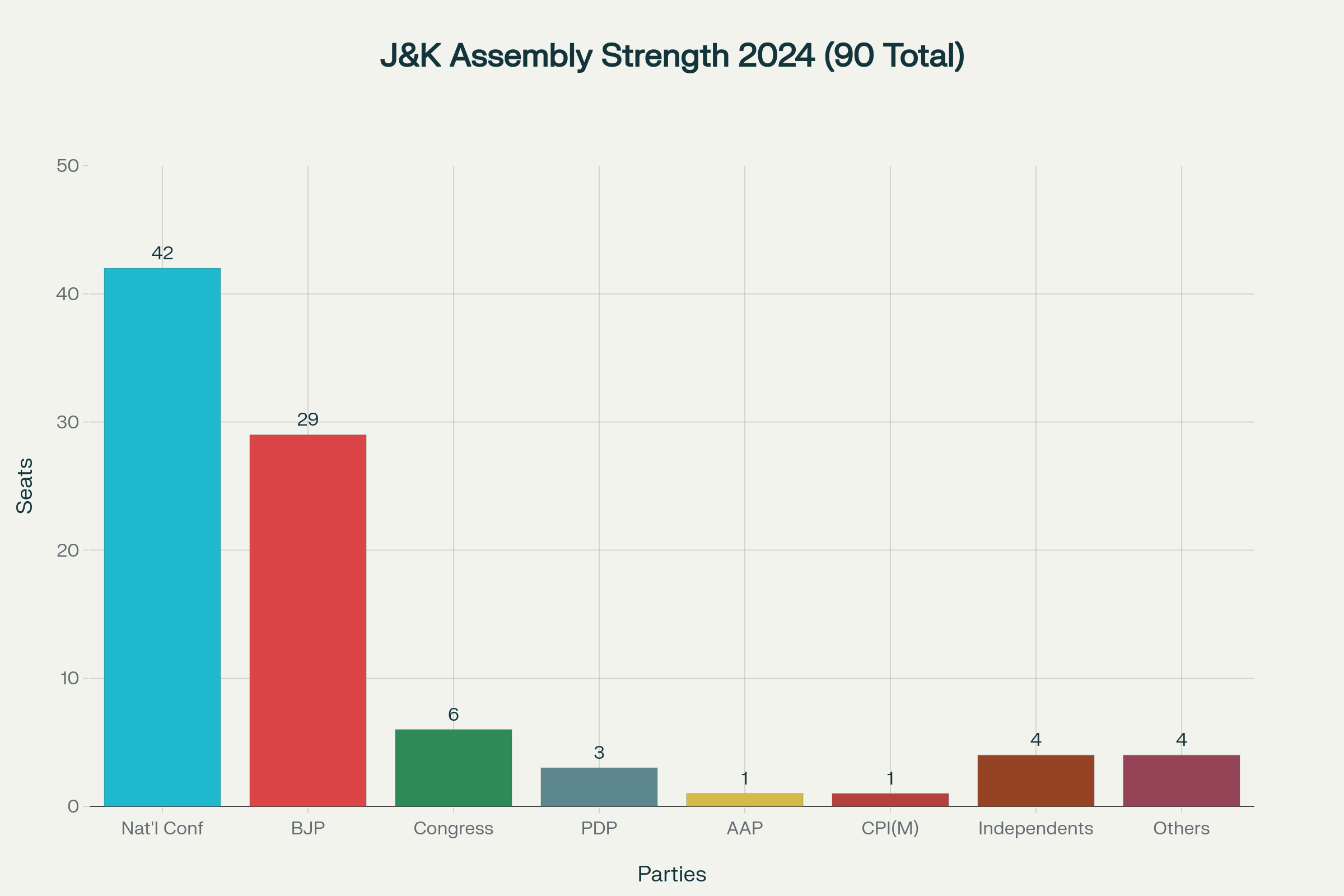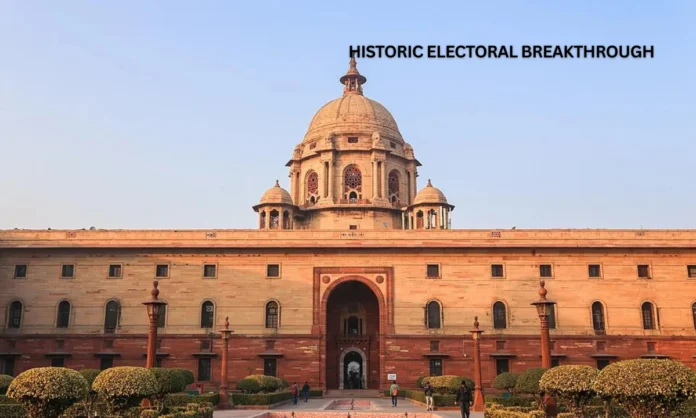Key Highlights:
- Election Commission announces Rajya Sabha elections for four vacant J&K seats and one Punjab seat on October 24, 2025
- These Rajya Sabha elections mark the first in J&K since February 2021, ending a 4.5-year parliamentary representation gap
- NC-led alliance positioned to win three seats while BJP likely to secure one based on current legislative assembly strength
Opening Overview
The Election Commission of India has finally announced the much-awaited Rajya Sabha elections Jammu Kashmir, breaking a legislative deadlock that has persisted since February 2021. The announcement represents a significant milestone in the political restoration of the union territory, with polling scheduled for October 24, 2025, to fill four vacant Upper House seats that have remained unoccupied for over four years. This electoral development coincides with a by-election for one Rajya Sabha seat from Punjab, creating a combined election exercise for five parliamentary positions.
The extended vacancy period stems from the unique constitutional challenges faced by Jammu and Kashmir following its reorganization in 2019. The Rajya Sabha elections Jammu Kashmir could not be conducted earlier due to the absence of the required electorate after the bifurcation of the erstwhile state into two union territories. The situation was further complicated by the dissolution of the legislative assembly and subsequent imposition of President’s rule, which left the territory without the necessary electoral college to conduct Upper House elections. This historic announcement marks the restoration of democratic processes in a region that has witnessed significant constitutional changes, making these Rajya Sabha elections Jammu Kashmir a crucial test of political normalcy and federal integration.

Party-wise seat distribution in Jammu and Kashmir Legislative Assembly following the 2024 elections, showing National Conference’s dominance with 42 seats out of 90 total assembly strength
Constitutional Framework and Legal Precedent
- The Election Commission will conduct three separate elections for four Rajya Sabha seats due to different biennial cycles
- Legal precedent from A.K. Walia vs Union of India (1994) mandates separate elections for different vacancy categories
The Election Commission’s decision to conduct three separate elections for four seats reflects adherence to established legal precedent and constitutional requirements for Rajya Sabha elections Jammu Kashmir. The four vacancies will be filled through three distinct electoral processes because the seats originally belonged to different biennial cycles, with two members retiring on February 10, 2021, and two others completing their terms on February 15, 2021. This approach follows the Delhi High Court judgment in A.K. Walia vs Union of India (1994), which established that separate elections must be held when vacancies fall under different categories.
The court ruling specifically stated, “Once the seats have been divided into the three categories from the inception, the Respondents were right in holding separate elections for each category,” providing the constitutional foundation for the current electoral structure. This legal framework ensures constitutional compliance while addressing the unique circumstances of J&K’s political transition for these Rajya Sabha elections Jammu Kashmir. The Election Commission has confirmed that separate notifications will be issued for each vacancy, maintaining the established practice for Upper House elections across all states and union territories.
The tenure of newly elected members remains subject to the outcome of a pending Supreme Court case, reflecting ongoing judicial considerations regarding the constitutional status of parliamentary representation in the reorganized territory. This uncertainty underscores the complex legal landscape surrounding the territory’s political reorganization and its implications for federal representation in future Rajya Sabha elections Jammu Kashmir. The constitutional framework also addresses questions about the continuity of democratic institutions and the balance between federal oversight and regional autonomy in the post-Article 370 era.
Electoral Dynamics and Political Implications
- National Conference-led alliance commands 53 members in the 90-seat assembly, positioning them for three Rajya Sabha victories
- BJP’s 29 seats will likely secure one seat through proportional representation system
The current composition of Jammu and Kashmir’s Legislative Assembly positions the National Conference-led alliance to secure three of the four seats in these crucial Rajya Sabha elections Jammu Kashmir. The alliance commands support from approximately 53 members, including 42 from the National Conference, six from Congress, four independents, and one from CPI(M), providing a decisive advantage in the proportional representation system. This mathematical strength in the 90-member assembly ensures comfortable victory margins for the alliance candidates, reflecting the electoral mandate from the 2024 assembly elections.
The Bharatiya Janata Party, despite winning 29 assembly seats and securing the highest vote share of 25.64% in the 2024 elections, is positioned to claim only one seat in these Rajya Sabha elections Jammu Kashmir. This distribution reflects the proportional nature of Upper House elections, where the alliance’s combined strength provides decisive electoral advantage over individual party performance. The separate election structure further benefits the NC-Congress alliance, as two individual elections for single seats will likely favor their candidates, while the combined election for two seats will be shared between the alliance and BJP.
The political significance extends beyond numerical representation, marking J&K’s return to full parliamentary participation after years of federal oversight through these historic Rajya Sabha elections Jammu Kashmir. The elections restore the territory’s voice in national legislation and policy formulation, addressing long-standing demands from regional political parties for constitutional representation in the Upper House. This development also strengthens the legitimacy of the current elected government and provides a platform for regional issues to be raised at the national level through proper parliamentary channels.
Administrative Framework and Election Process
- Polling scheduled for October 24, 2025, from 9 AM to 4 PM with counting beginning at 5 PM
- Special security measures and observer deployment to ensure free and fair elections
The Election Commission has established a comprehensive administrative framework for the October 24 Rajya Sabha elections Jammu Kashmir, with notification issuance scheduled for October 6, 2025. The electoral timeline includes nomination filing until October 13, scrutiny on October 14, and candidate withdrawal deadline of October 16, following established procedures for Upper House elections. Polling will occur from 9 AM to 4 PM, with vote counting beginning at 5 PM on the same day, ensuring rapid declaration of results for these critical Rajya Sabha elections Jammu Kashmir.
Special measures have been implemented to ensure electoral integrity, including mandatory use of violet sketch pens with specific specifications provided by Returning Officers for marking ballot preferences. The Commission will deploy sufficient observers to monitor the electoral process, reflecting the high-stakes nature of these historic elections that restore parliamentary representation to the region. These administrative protocols align with established procedures while accommodating the unique circumstances of conducting the first Rajya Sabha elections Jammu Kashmir since the territory’s reorganization.
The simultaneous Punjab by-election addresses the vacancy created by AAP MP Sanjeev Arora’s resignation following his election to the Punjab Assembly from Ludhiana West constituency. Arora’s departure from the Rajya Sabha to join the state cabinet exemplifies ongoing political realignments within regional parties, with speculation surrounding potential AAP nominees for the vacant position. The combined election exercise demonstrates the Election Commission’s capacity to manage multiple electoral processes simultaneously while maintaining constitutional compliance and democratic standards for both the Rajya Sabha elections Jammu Kashmir and Punjab.
Final Perspective
The announcement of Rajya Sabha elections Jammu Kashmir marks a watershed moment in the territory’s post-2019 political evolution, ending a four-year vacuum in Upper House representation that has limited regional voice in national policy formulation. The restoration of parliamentary elections demonstrates the gradual normalization of democratic processes while establishing crucial precedents for constitutional governance in reorganized territories.
These historic Rajya Sabha elections Jammu Kashmir will not only fill vacant seats but also legitimize the territory’s continued integration into India’s federal democratic structure, setting the stage for future political developments in this strategically important region. The successful conduct of these elections will serve as a testament to the resilience of democratic institutions and the commitment to constitutional governance in the face of unprecedented political transitions.


